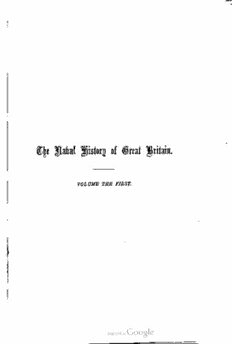
The Naval History of Great Britain, from the declaration of war by France in 1793 to the accession of George IV. PDF
Preview The Naval History of Great Britain, from the declaration of war by France in 1793 to the accession of George IV.
The Naval History of Great Britain. VOLUME THE FIRST. THE NAVAL HISTORY OF GREAT BRITAIN, FROM THE DECLARATION OF WAR BY FRANCE IN 1793 TO THE ACCESSION OF GEORGE IV. BY WILLIAM JAMES. 1 New Edition, with Additions and Notes, BRINGING THE WORK DOWN TO 1827. 1 ..رت VERITE SANS PEUR. D U C IN SIX VOLUMES.- Vol. I. LONDON: RICHARDBENTLEY& SON, NEWBURLINGTON STREET, Publishers in Ordinary to Her Majesty the Queen. 1886.. LONDON: PRINTEDBY WILLIAM CLOWES AND SONS, LIMITED, STAMFORD STREET AND CHARING CROSS. l i (r! ī 1/16-06 83459 B.P.S. (Lovole) TO THE BRITISH NATION, THIS FAITHFUL HISTORY OF ITS NAVY, OF THE SERVICES OF HIS MAJESTY'S FLEETS, SQUADRONS, AND SINGLE SHIPS, BY THE LATE WILLIAM JAMES, ESQ., IS RESPECTFULLY DEDICATED BY THE EDITOR. 87 129 V.. PREFACE TO THE NEW EDITION. Anewedition of“ James'sNaval History” demands afew pre a fatoryremarks. SincetheBattleofNavarino(foughtonthe20th of October, 1827), withwhichthe work concludes, an element in nautical science unknownto ourforefathers has passed into universaladoption, renderingthe evolutions of fleetsand single shipsalmostentirelyindependentofthe fluctuationsofwindand weather; and settingasidethemostapprovedsystems ofattack anddefence, as hitherto practisedbythe ablest commanders. The introduction of steam must produce anotherchange in maritimewarfare, equal to that occasioned bythe inventionof gunpowder. History and past experience will cease to be referred to as practical teachers. The best lessons they can now supply are confinedto theexamples of skill, courage, and patriotic devotion, never to be surpassed, from which future Nelsonsmaylearnhowthebattlesofthatgreatadmiral andhis contemporaries werefoughtandwon. Butwhile navalstudents admire these glorious records, they will see at once that the tacticsofthelastgeneration will ceasetobeavailableinfuture. Theywilllearntounderstandfullythedifficultiesanddeficiencies inseparable from the manoeuvres of sailing-fleets, with all the casual impediments of storms, or calms, ofbaflingorcontrary winds, of lee shores, tides, currents, shoals, or breakers; and they will also rejoice while they wonder, at finding these ob staclescomparativelynegativedbytheabsolutepowerof steam viii PREFACE TO THE NEW EDITION. propulsion,-apowerwhichcanbeexercisedandregulated with almostmathematical certainty. Steammaybe consideredthe mostimportantagentinmecha nics that man's ingenuity has yet brought into action. Its early development was slow — unlike printing, which reached perfection in infancy; buttheprogress of steam, aspractically exercised within the last thirty years, is a tissue of marvels, openingprospects thatbaffle theory, and setthecalculations of reasonatdefiance. The idea of motion produced by steam -pressureappears to have originated with an Italian, named Brancas, residing at Rome, in 1628. The firstreal steam -engineis describedbythe MarquisofWorcester,afaithfulroyalist,inasmallpamphletpub lishedthreeyears aftertherestorationofCharlesthe Second,in 1663,entitled“ACenturyof Inventions.” Hecallsit,“ awayto driveupwaterby fire;" butneitherthepublicnorthegovernment appearedtobemuchattractedbythe discovery. Hadthe Star chamber not been abolished, the noble inventor would have incurredtherisk ofbeingbroughtbeforethatrighteoustribunal foranunholy alliancewiththepowers ofdarkness. In 1769, James Watt, thena mathematical instrument-maker in Glasgow,obtainedapatent forhis greatinventionofperform ing condensation in a separate vessel from the cylinder. To this he made many subsequent improvements, and acquired additional patents. In 1778, the notorious ThomasPaine pro > posedtheapplication ofsteamin America; andin 1807, Robert Fulton, anative of Pennsylvania, started a smallsteam -boat on the Hudson river. The progress of this vessel through the water scarcelyexceeded five miles anhour. Fultonhadmedi tated onthe experimentsince 1793 ; butalthough he claimedto be the firstwho appliedwater-wheelstothepurposes of steam navigation, most assuredly he was not the inventor. Yet lie has often been so called, asinnaming the new world, Amerigo Vespuccihas supplanted Columbus to whom thelawful parent age belongs. Mr. Millar, of Dalswinton, inDumfriesshire, a Scotch gentle. man of good familyand fortune, and with a mind devotedto mechanical inquiry,expended manyyears, andmanythousands.
